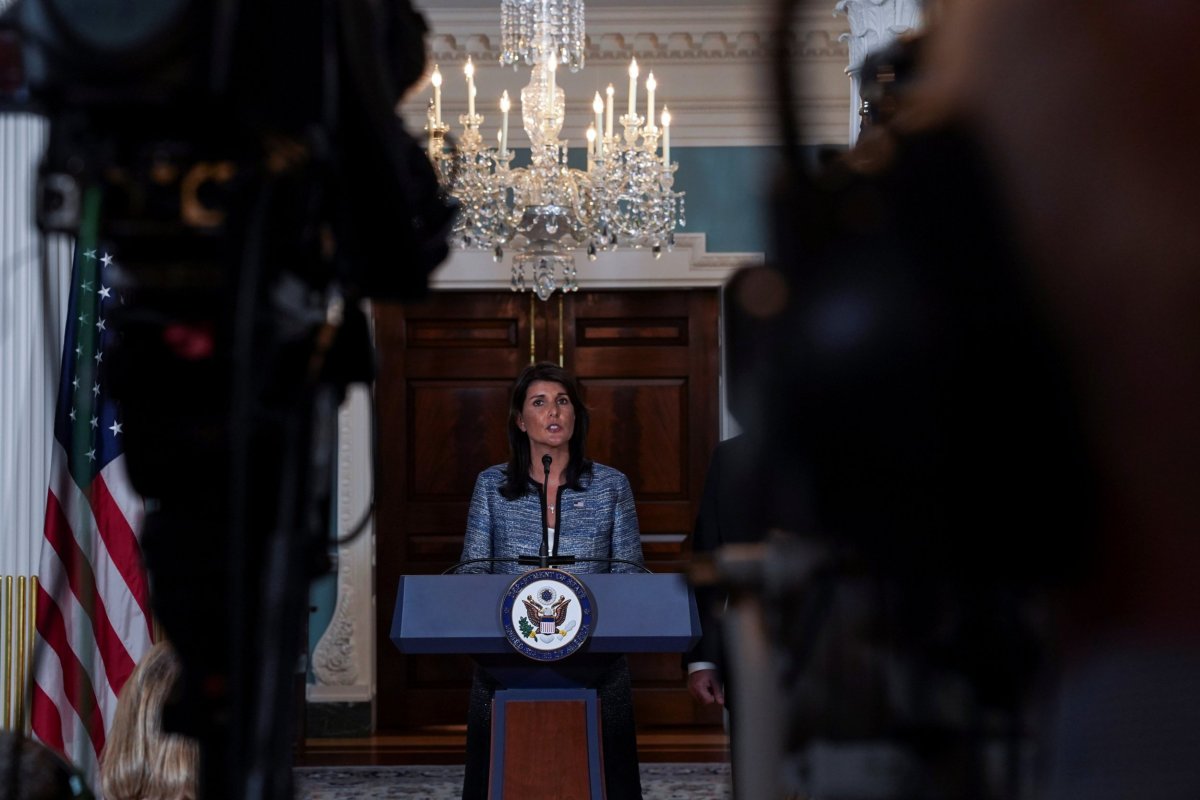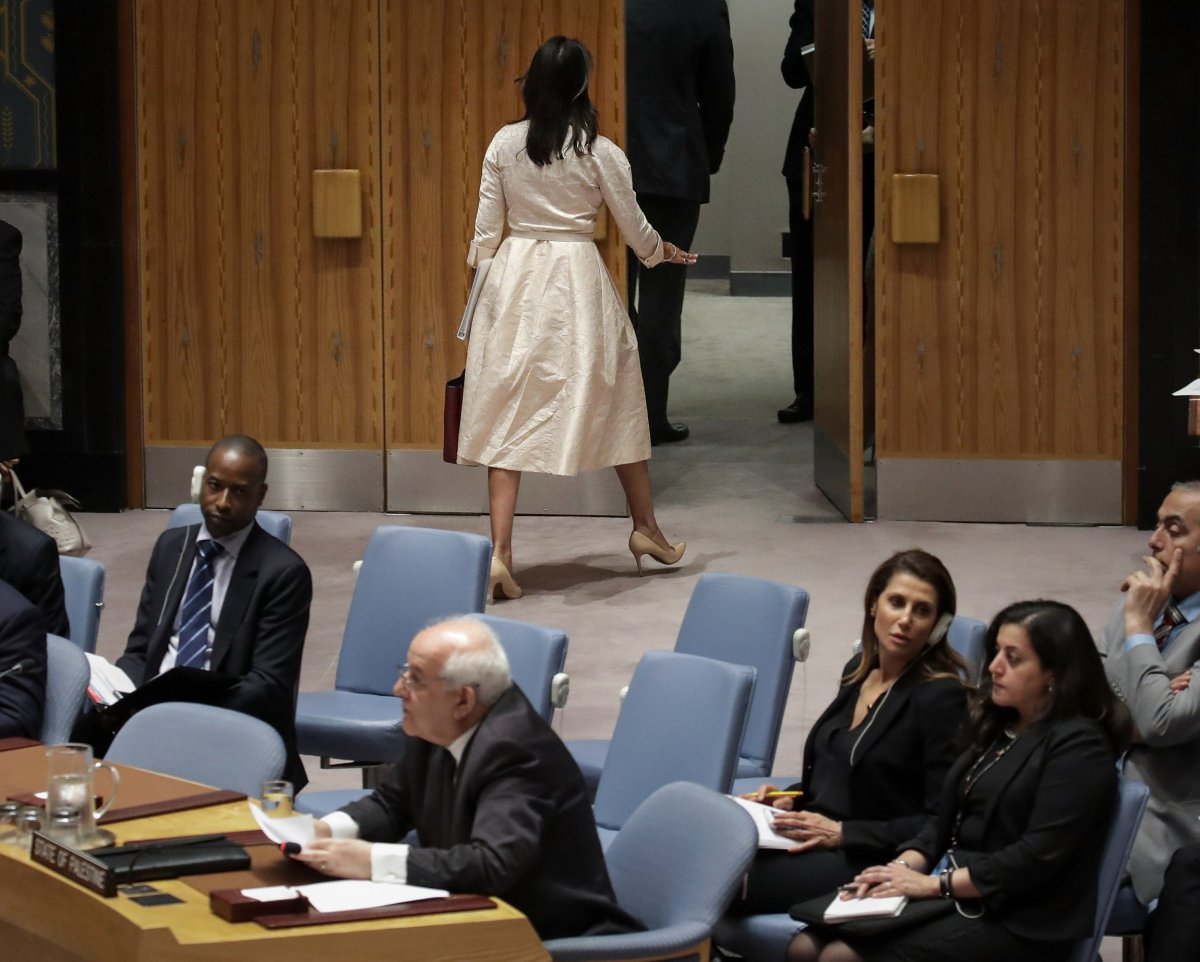The United States has withdrawn from the United Nations Human Rights Council (UNHRC) over its criticism of Israel's treatment of Palestinians.
Nikki Haley, the U.S. ambassador to the United Nations, branded the UNHRC a "cesspool of political bias" that "makes a mockery of human rights" as she announced America's disengagement, CNN reported.
In a joint press conference with U.S. Secretary of State Mike Pompeo, Haley said the UNHRC was "hypocritical and self-serving," while Pompeo called it "a poor defender of human rights."
Vice President Mike Pence said the UNHRC "has engaged in ever more virulent anti-American, and anti-Israel invective," declaring that "the days of U.S. participation are over."

The 47-member UNHRC was created in 2006 to promote and protect human rights across the globe while investigating allegations of human rights breaches in United Nations states. Members are elected to serve three-year terms on the council.
Meeting three times each year, the UNHRC reviews the records of all United Nations members in its Universal Periodic Review, offering each nation the chance to show how it has been improving human rights.
Though it has no power to punish offenders, the body can draw international attention to abuses and call on suspected culprits to explain their actions.
The UNHRC can also establish commissions of inquiry to report on significant human rights allegations, and has done so in countries such as Syria, North Korea, Burundi, Myanmar and South Sudan.
The U.S. has had a troubled relationship with the council since its founding. Formed during President George W. Bush's second term, the U.S. refused to take part because of a perceived bias against Israel and the inclusion of states accused of rights abuses.
The U.S. finally joined the UNHRC in 2009 under President Barack Obama, and was re-elected to the council in 2012.
But critics have continued to dismiss the organization, especially after China, Cuba, Russia, Saudi Arabia and Vietnam were elected members in 2013. Detractors say giving repressive states seats on the council simply allows them to ensure their own impunity.
The most recent break between the UNHRC and the U.S. followed recent criticism of Israel's treatment of Palestinian protesters in the Gaza Strip, after more than 100 were shot dead by Israeli troops.
At the height of the killings, Haley walked out of a meeting of the United Nations Security Council in protest as the Palestinian envoy was speaking.
Haley has led the U.S.'s staunch defence of Israel at the United Nations since President Donald Trump entered the White House.
Israel is the only state subject to a permanent standing agenda item, meaning its policy toward the Palestinians is regularly discussed.
Israeli Prime Minister Benjamin Netanyahu tweeted in praise of what he called a "courageous decision" to abandon a "biased, hostile, anti-Israel organization that has betrayed its mission of protecting human rights."

The U.S. withdrawal comes amid widespread criticism of Trump's immigration policy, under which undocumented migrant children are being separated from their parents and held at detention centers.
On Monday, United Nations Human Rights Commissioner Zeid Ra'ad al-Hussein called the policy "unconscionable." Trump has also been accused of ignoring human rights when he met with North Korean leader Kim Jong Un in Singapore last week. After the summit, Trump praised the dictator as a "very talented man."
United Nations Secretary-General António Guterres said he would have "much preferred" the U.S. to remain a member of the council, while al-Hussein said the decision was "disappointing, if not really surprising."
Though Haley said the move was "not a retreat from our human rights commitments," other nations have voiced their concern. The current UNHRC president, Slovenian Ambassador Vojislav Suc, said the body was the only one tracking human rights issues worldwide, calling it "essential" to "uphold a strong and vibrant council."
The American Civil Liberties Union said the combination of the Trump administration's withdrawal from the UNHRC and enforcement of a harsh immigration policy "only confirms what we've always known —Trump is leading a concerted, aggressive effort to violate basic human rights of those most in need of protection."
Uncommon Knowledge
Newsweek is committed to challenging conventional wisdom and finding connections in the search for common ground.
Newsweek is committed to challenging conventional wisdom and finding connections in the search for common ground.
About the writer
David Brennan is Newsweek's Diplomatic Correspondent covering world politics and conflicts from London with a focus on NATO, the European ... Read more
To read how Newsweek uses AI as a newsroom tool, Click here.








